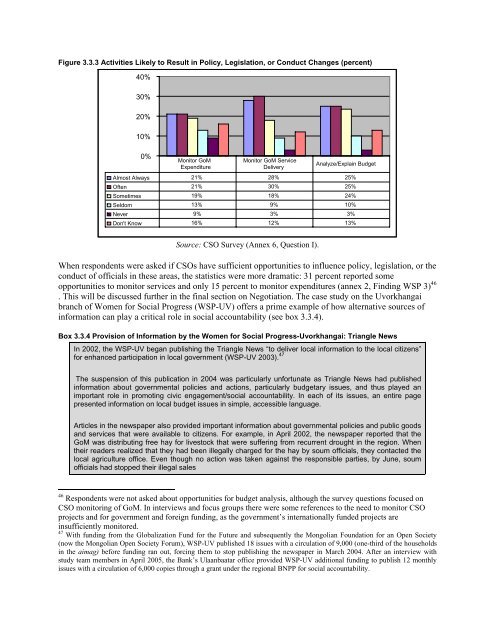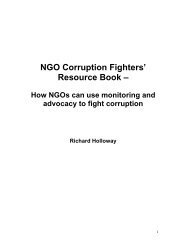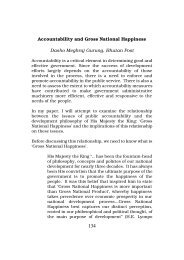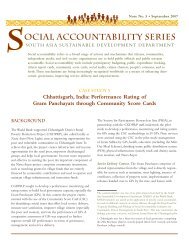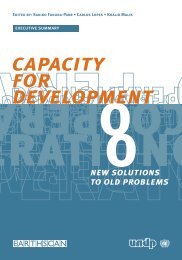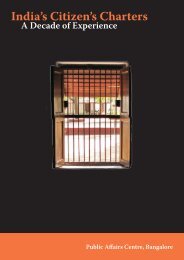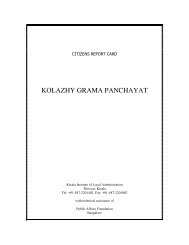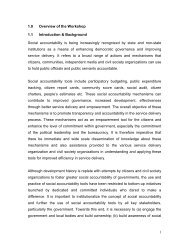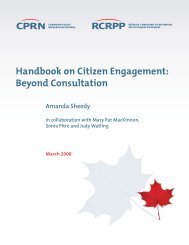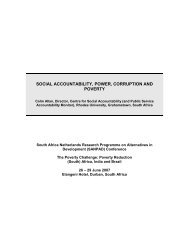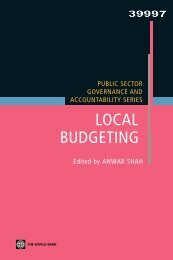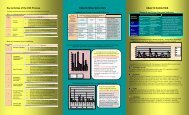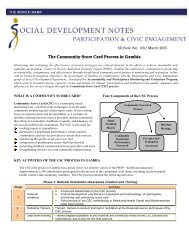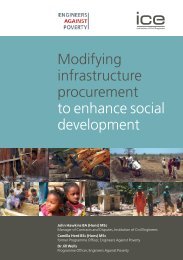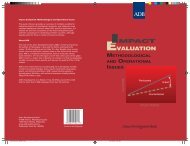Enabling Environment for Social Accountability in ... - SASANet
Enabling Environment for Social Accountability in ... - SASANet
Enabling Environment for Social Accountability in ... - SASANet
Create successful ePaper yourself
Turn your PDF publications into a flip-book with our unique Google optimized e-Paper software.
Figure 3.3.3 Activities Likely to Result <strong>in</strong> Policy, Legislation, or Conduct Changes (percent)<br />
40%<br />
30%<br />
20%<br />
10%<br />
0%<br />
Monitor GoM<br />
Expenditure<br />
Monitor GoM Service<br />
Delivery<br />
Analyze/Expla<strong>in</strong> Budget<br />
Almost Always 21% 28% 25%<br />
Often 21% 30% 25%<br />
Sometimes 19% 18% 24%<br />
Seldom 13% 9% 10%<br />
Never 9% 3% 3%<br />
Don't Know 16% 12% 13%<br />
Source: CSO Survey (Annex 6, Question I).<br />
When respondents were asked if CSOs have sufficient opportunities to <strong>in</strong>fluence policy, legislation, or the<br />
conduct of officials <strong>in</strong> these areas, the statistics were more dramatic: 31 percent reported some<br />
opportunities to monitor services and only 15 percent to monitor expenditures (annex 2, F<strong>in</strong>d<strong>in</strong>g WSP 3) 46<br />
. This will be discussed further <strong>in</strong> the f<strong>in</strong>al section on Negotiation. The case study on the Uvorkhangai<br />
branch of Women <strong>for</strong> <strong>Social</strong> Progress (WSP-UV) offers a prime example of how alternative sources of<br />
<strong>in</strong><strong>for</strong>mation can play a critical role <strong>in</strong> social accountability (see box 3.3.4).<br />
Box 3.3.4 Provision of In<strong>for</strong>mation by the Women <strong>for</strong> <strong>Social</strong> Progress-Uvorkhangai: Triangle News<br />
In 2002, the WSP-UV began publish<strong>in</strong>g the Triangle News “to deliver local <strong>in</strong><strong>for</strong>mation to the local citizens”<br />
<strong>for</strong> enhanced participation <strong>in</strong> local government (WSP-UV 2003). 47<br />
The suspension of this publication <strong>in</strong> 2004 was particularly un<strong>for</strong>tunate as Triangle News had published<br />
<strong>in</strong><strong>for</strong>mation about governmental policies and actions, particularly budgetary issues, and thus played an<br />
important role <strong>in</strong> promot<strong>in</strong>g civic engagement/social accountability. In each of its issues, an entire page<br />
presented <strong>in</strong><strong>for</strong>mation on local budget issues <strong>in</strong> simple, accessible language.<br />
Articles <strong>in</strong> the newspaper also provided important <strong>in</strong><strong>for</strong>mation about governmental policies and public goods<br />
and services that were available to citizens. For example, <strong>in</strong> April 2002, the newspaper reported that the<br />
GoM was distribut<strong>in</strong>g free hay <strong>for</strong> livestock that were suffer<strong>in</strong>g from recurrent drought <strong>in</strong> the region. When<br />
their readers realized that they had been illegally charged <strong>for</strong> the hay by soum officials, they contacted the<br />
local agriculture office. Even though no action was taken aga<strong>in</strong>st the responsible parties, by June, soum<br />
officials had stopped their illegal sales<br />
46 Respondents were not asked about opportunities <strong>for</strong> budget analysis, although the survey questions focused on<br />
CSO monitor<strong>in</strong>g of GoM. In <strong>in</strong>terviews and focus groups there were some references to the need to monitor CSO<br />
projects and <strong>for</strong> government and <strong>for</strong>eign fund<strong>in</strong>g, as the government’s <strong>in</strong>ternationally funded projects are<br />
<strong>in</strong>sufficiently monitored.<br />
47 With fund<strong>in</strong>g from the Globalization Fund <strong>for</strong> the Future and subsequently the Mongolian Foundation <strong>for</strong> an Open Society<br />
(now the Mongolian Open Society Forum), WSP-UV published 18 issues with a circulation of 9,000 (one-third of the households<br />
<strong>in</strong> the aimag) be<strong>for</strong>e fund<strong>in</strong>g ran out, <strong>for</strong>c<strong>in</strong>g them to stop publish<strong>in</strong>g the newspaper <strong>in</strong> March 2004. After an <strong>in</strong>terview with<br />
study team members <strong>in</strong> April 2005, the Bank’s Ulaanbaatar office provided WSP-UV additional fund<strong>in</strong>g to publish 12 monthly<br />
issues with a circulation of 6,000 copies through a grant under the regional BNPP <strong>for</strong> social accountability.


